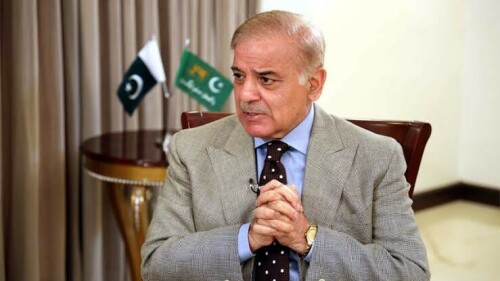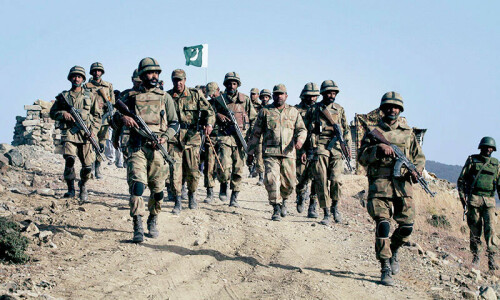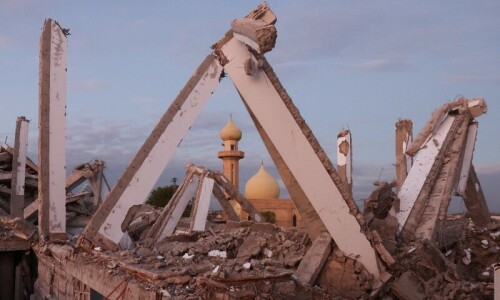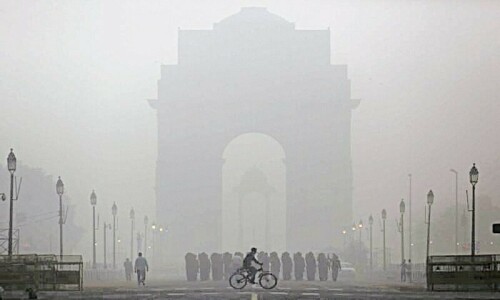THE army, along with the navy in a specific instance, has been engaged in a damage-control exercise after several setbacks during the last quarter that brought its high-profile role under public scrutiny.
These setbacks relate to both policy such as the alleged role of the security apparatuses in the country’s politics or the undeclared operation in Balochistan, and what is described as operational lapses such as the Abbottabad operation and the attack on PNS Mehran. A series of embarrassing events as well as statements issued by leading politician Nawaz Sharif caused concern in the relevant quarters and would have hopefully led to an in-house inquiry into the public profile of the men at arms.
Of course, the security lapses in the two cases of Abbottabad and Karachi set the ball rolling in this direction. Washington understood the phenomenon of Osama bin Laden’s presence in the garrison town in terms of either inefficiency or complicity. The strategic community of Pakistan has typically denied the latter, thus addressing the concerns of the world at large about any possible connivance between the terrorist groups and anti-terrorist agencies. The general public would have wanted it to do otherwise in an anti-American mode of thinking.
The default option of inefficiency is indeed horrifying for those who always considered the army as the bastion of national security. This is indeed much more depressing than the other option as far as the domestic public is concerned. In this context, Gen (retd) Nadeem Akbar’s statement about the ‘innocence’ of the security agencies with regard to the presence of Bin Laden in Abbottabad is amazingly unimaginative, because it makes a virtue out of ignorance.
Indeed, Gen Akbar’s decision to go public on a matter that is at the heart of the ongoing inquiry entrusted to the commission headed by Justice Javed Iqbal has elicited adverse comments in the media and public. It was understood to be against the spirit of judicial inquiry and liable to be interpreted as an attempt to influence the proceedings of the commission. Obviously, men in uniform are obliged to show deference to the judicial process as much as civilians, if not more.
At the other end, the international cyberworld has condemned what is described as Pakistan’s dirty war in Balochistan. The media, the Supreme Court and the human rights establishment have been trying to address the issue of the ‘missing’ Baloch activists. The so-called ‘kill and dump’ phenomenon in that province has now earned opprobrium both at home and abroad. A recent statement from the military high command in Quetta put the blame on ‘patriotic elements’ instead, thus giving the extrajudicial killings a positive colour.
As if the human rights disaster in Balochistan were not enough, Saleem Shahzad’s murder has been publicly laid at the door of the top security agency. The emergent career of a renowned journalist has been tortuously put to an end. No satisfactory solution to the riddle of his murder has been forthcoming while the judicial inquiry into this heinous crime is in the process. This poses a great challenge to ISPR’s potential to transform public opinion in this regard.
Nawaz Sharif’s fiery statements in recent weeks against the army’s political role were as surprising for political analysts as presumably unsettling for the military establishment. People think that only a politician from Punjab could have taken on the army and that too of the stature of the PML-N chief. He described the present government as representing the agencies’ rule and demanded an end to their political input. This points to the theme and tone of PML-N rhetoric in the forthcoming elections
The latest news-making revelation about the armed forces is the matter of financial irregularities in the defence sector that will soon be taken up by the Public Accounts Committee. For the civilian government and parliament, this is apparently an issue of accountability as much as in the case of other institutions. For men in uniform, the idea of being answerable to civilian bosses is the exception rather than the rule, despite their willingness in public to cooperate in these matters.
Although there is a general perception that the present civilian set-up is a façade for indirect army rule, any rule of public representatives has dynamics of its own. Combined with a strident media, the proceedings of parliamentary committees tend to pursue accountability drives that sometimes transcend self-imposed restrictions. That in turn puts pressure on various organisations, including the army that sees itself as the sole corruption-free institution in the country.
How does the defence establishment deal with the slide in public image at home and abroad? Its typical response has been to address the issue of media coverage, but not to change policy. That points to a lack of intellectual input in strategic thinking from outside the security framework, unshackled by the deeply ingrained institutional mode of thinking. Whatever intellectual input is available to policymaking organs is generally the result of a co-option strategy. This has led to a simple dichotomy between the critical and obliging intellectuals and analysts.
One hears about projects in certain western countries to study the divergence between policy orientations of men at arms and the articulate sections of the public. These democracies have in-built mechanisms to defuse the adverse effect of this gap of perspectives on the body politic. The current government in Pakistan, like its predecessors in the 1990s, has shied away from addressing the issue of a persistent lack of understanding on critical issues between the two sides.
Not surprisingly, the agenda of fighting the Taliban-led militancy in Pakistan has run into controversy. One finds a confusing pattern of attitudes and opinions regarding the war on terror. This confusion underscores the issues of drone attacks, the Shamsi airbase, relations with the US and the aid imbroglio. The security apparatus faces the challenge of developing a clearly defined strategy and rationalising its policy objectives.
The writer is a professor at LUMS.












































Dear visitor, the comments section is undergoing an overhaul and will return soon.